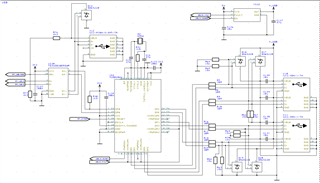Other Parts Discussed in Thread: SEGGER
Hi,
I'm developing a board for the Raspberry CM4. Here is the relevant part of the schematic:

My confusing problem: The linux distribution on my CM4 is detecting nearly every device I tested like memory sticks, Segger JTAG adapters, RF mouse adapters and so on. But it does not detect any keyboard. Here is a log I made by "sudo tail -f /var/log/syslog" when plugging in a keyboard:
Sep 12 15:53:08 ac3000 kernel: [ 1113.439475] usb 1-1.4: new low-speed USB device number 54 using dwc2
Sep 12 15:53:08 ac3000 kernel: [ 1113.979470] usb 1-1.4: new low-speed USB device number 55 using dwc2
Sep 12 15:53:09 ac3000 kernel: [ 1114.420540] usb 1-1-port4: attempt power cycle
Sep 12 15:53:09 ac3000 kernel: [ 1115.079529] usb 1-1.4: new low-speed USB device number 56 using dwc2
Sep 12 15:53:10 ac3000 kernel: [ 1115.619511] usb 1-1.4: new low-speed USB device number 57 using dwc2
And this is the log when I plug in a memory stick:
Sep 12 15:54:21 ac3000 kernel: [ 1186.750085] usb 1-1.1: new full-speed USB device number 58 using dwc2
Sep 12 15:54:21 ac3000 kernel: [ 1186.882193] usb 1-1.1: not running at top speed; connect to a high speed hub
Sep 12 15:54:21 ac3000 kernel: [ 1186.888293] usb 1-1.1: New USB device found, idVendor=1221, idProduct=3234, bcdDevice= 0.00
Sep 12 15:54:21 ac3000 kernel: [ 1186.888313] usb 1-1.1: New USB device strings: Mfr=1, Product=2, SerialNumber=3
Sep 12 15:54:21 ac3000 kernel: [ 1186.888332] usb 1-1.1: Product: Flash Disk
Sep 12 15:54:21 ac3000 kernel: [ 1186.888349] usb 1-1.1: Manufacturer: USB2.0
Sep 12 15:54:21 ac3000 kernel: [ 1186.888366] usb 1-1.1: SerialNumber: 1000000000001DCD
Sep 12 15:54:21 ac3000 kernel: [ 1186.889648] usb-storage 1-1.1:1.0: USB Mass Storage device detected
Sep 12 15:54:21 ac3000 kernel: [ 1186.890572] scsi host0: usb-storage 1-1.1:1.0
Sep 12 15:54:21 ac3000 mtp-probe: checking bus 1, device 58: "/sys/devices/platform/soc/fe980000.usb/usb1/1-1/1-1.1"
Sep 12 15:54:21 ac3000 mtp-probe: bus: 1, device: 58 was not an MTP device
Sep 12 15:54:21 ac3000 mtp-probe: checking bus 1, device 58: "/sys/devices/platform/soc/fe980000.usb/usb1/1-1/1-1.1"
Sep 12 15:54:21 ac3000 mtp-probe: bus: 1, device: 58 was not an MTP device
Sep 12 15:54:21 ac3000 kernel: [ 1186.990115] usb 1-1.4: new low-speed USB device number 59 using dwc2
Sep 12 15:54:22 ac3000 kernel: [ 1187.540120] usb 1-1.4: new low-speed USB device number 60 using dwc2
Sep 12 15:54:22 ac3000 kernel: [ 1187.924222] scsi 0:0:0:0: Direct-Access USB2.0 Flash Disk 2.10 PQ: 0 ANSI: 2
Sep 12 15:54:22 ac3000 kernel: [ 1187.925036] sd 0:0:0:0: Attached scsi generic sg0 type 0
Sep 12 15:54:22 ac3000 kernel: [ 1187.929200] sd 0:0:0:0: [sda] 1026816 512-byte logical blocks: (526 MB/501 MiB)
Sep 12 15:54:22 ac3000 kernel: [ 1187.932202] sd 0:0:0:0: [sda] Write Protect is off
Sep 12 15:54:22 ac3000 kernel: [ 1187.932225] sd 0:0:0:0: [sda] Mode Sense: 0b 00 00 08
Sep 12 15:54:22 ac3000 kernel: [ 1187.935211] sd 0:0:0:0: [sda] No Caching mode page found
Sep 12 15:54:22 ac3000 kernel: [ 1187.935233] sd 0:0:0:0: [sda] Assuming drive cache: write through
Sep 12 15:54:22 ac3000 kernel: [ 1187.981183] usb 1-1-port4: attempt power cycle
Sep 12 15:54:22 ac3000 kernel: [ 1187.993181] sda:
Sep 12 15:54:22 ac3000 kernel: [ 1188.007196] sd 0:0:0:0: [sda] Attached SCSI removable disk
Sep 12 15:54:23 ac3000 kernel: [ 1188.640106] usb 1-1.4: new low-speed USB device number 61 using dwc2
Sep 12 15:54:24 ac3000 kernel: [ 1189.180122] usb 1-1.4: new low-speed USB device number 62 using dwc2
When probing the D+ and D- signals with an oscilloscope during plugging in the keyboard I see some signals on D+ but just a flat zero line ion D-.
As I'm no USB expert, does anybody have a hint where to look deeper?
Thanks a lot!
Regards,
Oliver










